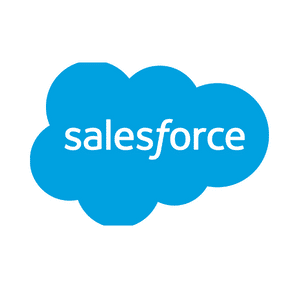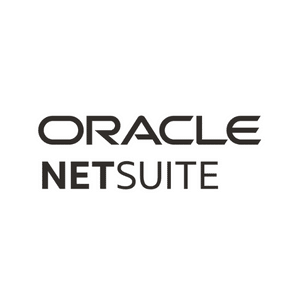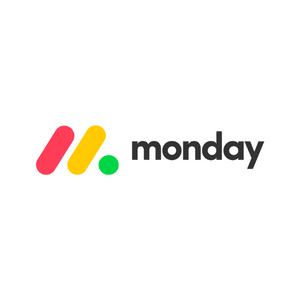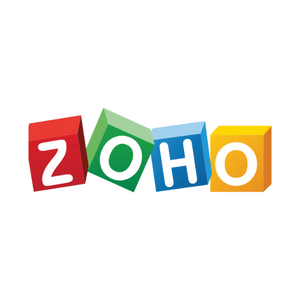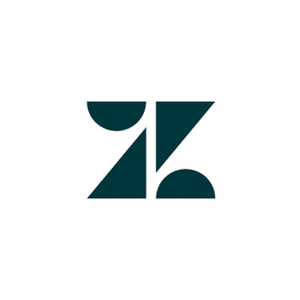Healthcare customer relationship management (CRM) is an integrated organizational and efficiency tool for hospitals everywhere.
However, finding the most suitable CRM tool for a hospital can be tricky, given the many available options.
Throughout years of being a project manager for a renowned hospital, I have grown familiar with each of the healthcare CRM methods on this list in hopes that it helps you find the perfect option for your agency.
I’ve ranked each system based on its pros and cons, stand-out features, pricing, and more; that way, you have all the information you need to select the right healthcare CRM system.
What is a Healthcare CRM?
A healthcare CRM is an important tool for running a successful hospital system; it helps you manage patient records, improve health education, track customer interactions, and follow up with prospects.
It also allows you to identify new trends in your customer base and implement strategies that will help increase patient satisfaction while keeping up-to-date on the latest technological advancements in the healthcare industry.
So, if you are looking for a reliable and efficient CRM system to manage your patients’ information, read on.
Below you can find my list of the best CRM systems for healthcare you can use in 2023 and what makes these systems beneficial for any hospital, no matter how big or small.
Healthcare CRM System Benefits
Improve Patient Experience
CRM healthcare providers help hospitals better understand their patients’ needs by collecting data on patient experience.
Collecting more patient data allows hospitals to provide more tailored services and build relationships with patients, ultimately leading to improved patient experiences.
Therefore, when hospitals have more information on each patient, healthcare professionals can offer a more personal healthcare solution.
Healthcare CRM tools should always follow HIPAA compliance regulations to ensure electronic health records are safe.
Manage Patient Data
Using a CRM system to manage patient data is a great way to ensure that all relevant information is kept organized and up-to-date.
Some of this data includes medical histories, hospital visits, medications prescribed, appointments scheduled, insurance claims made, and more.
Having this data easily accessible enables healthcare professionals to provide quick and efficient service, helping to improve the overall patient experience.
CRMs can also track patient acquisition data, helping users stay organized and streamline referral management.
Optimize Business Processes
Using a CRM system for healthcare can also help optimize your organization’s business processes.
By automating certain tasks, such as appointment scheduling and billing, you can free up more time for healthcare professionals to focus on patient care.
Plus, with the help of analytics tools, hospitals can gain valuable insights into their customer base and make data-driven decisions to further optimize their business processes.
Marketing Automation
Marketing automation is another key benefit of CRM systems for healthcare.
Hospitals can use the system to design marketing campaigns and create automated workflows, making it easier to target specific audiences and boost conversion rates.
The automation feature also helps reduce manual tasks, allowing hospitals to focus their time on more important activities such as developing patient relationships and improving customer experience instead of sending mass emails or posting on social media platforms.
Some CRMs include templates for direct mail handouts and emails, allowing users to send more personalized messages.
Improve High-Quality Treatment
High-quality treatment is one of the most important benefits of healthcare customer relationship management systems.
By collecting data from patient records, appointments, and insurance claims, hospitals can identify where their services are lacking and make the necessary improvements to ensure patients receive quality care.
With access to actionable insights and analytics tools, healthcare professionals can more effectively manage patient care and ensure that each patient receives the best possible treatment.
Also, because most CRMs are HIPAA-compliant and adhere to the Accountability Act, users can rest assured knowing all their data is safe.
Reduce Medical Errors
One factor that people are often unaware of is that healthcare CRM systems can also help reduce medical errors.
By collecting and organizing patient data, hospitals can quickly identify problems or discrepancies in a patient’s medical history and take corrective action to ensure the best possible care is provided.
Quickly identifying problems helps ensure that patients receive only the best treatment while reducing potential misdiagnoses or mistakes that could lead to medical errors.
Client Feedback
Further, one of the key benefits of healthcare CRM systems is that hospitals can collect patient feedback.
By doing so, healthcare providers can gain valuable insights into their services and make necessary changes to improve customer experience.
Patients also appreciate being heard and taken seriously, making it more likely that they will return for future visits and recommend the hospital to others.
Some CRMs send electronic reports for customers to fill out with their feedback, and others allow users to send direct mail forms.
Data and Analytics
Finally, data and analytics are arguably the most important benefits of healthcare CRM systems.
Analytics tools enable hospitals to gain actionable insights into their operations, such as patient patterns, outcomes of treatment, and customer satisfaction.
With these insights, healthcare professionals can measure performance and make more informed decisions, leading to improved customer service and increased patient satisfaction.
Ultimately, data and analytics are essential components of any healthcare CRM system, helping to ensure that patients receive quality care while hospitals optimize their business processes.
How to Choose a Healthcare CRM Software
Survey Your Team
The first step in choosing healthcare CRM software is to survey your team.
It’s important to understand their needs and preferences as they are the ones that will be using the system on a day-to-day basis.
For example, does your team need natural language processing technology or health insurance portability?
If you know what features they need, it’ll be easier to narrow down your options and find the right CRM software for your healthcare organization.
Don’t forget to ask them what their biggest challenges are so that you can find a system that will address those needs as well.
Also, ensure the CRM you select is HIPAA-compliant.
Understand Current Issues In Your Organization
Once you understand the needs of your team, it’s time to look at the current issues in your organization and determine how healthcare CRM software can help address them.
Consider any weaknesses or gaps in patient care, customer service, or data management that need to be addressed and any areas where improvement is necessary.
By doing this, you can ensure that the CRM software you select will help your organization improve.
Understand the Below CRM Features
To determine which CRM software is right for your organization, you need to understand each CRM software’s features.
Consider the security and data protection that each system offers and any reporting and analytics tools it includes.
It’s also important to look at the different customization options available and ensure the software can integrate with your existing systems.
By taking some time to understand each CRM software’s features, you can ensure that you select the right system for your organization.
Test Drive a CRM with a Limited Number of Staff
The fourth step in choosing healthcare CRM software is to test drive a CRM with a small group of staff.
Test-driving a CRM will give you a hands-on feel for the system and determine if it’s right for your organization.
Try out different features, such as patient data management and patient follow-up, to ensure they function properly and meet your needs.
Also, don’t forget to ask the software vendor for any help or support you may need during this process.
Choose a CRM for Your Healthcare Facility
Finally, it’s time to choose a CRM for your healthcare facility.
Remember to factor in the needs of your team, current issues in your organization, and the features of each software when making your decision.
Also, test-drive a few different systems before settling on one, as this will ensure that you end up with the right CRM software for your organization.
Choosing healthcare CRM software is an important decision, and it should be taken seriously.
With careful consideration, you’ll find the perfect system to help streamline operations and improve patient satisfaction at your facility.
And lastly, also make sure you select a HIPAA-compliant CRM solution.
Best Healthcare CRM Software on the Planet (HIPPA Compliant)
As previously mentioned, I have several years of experience working with hospitals and healthcare organizations, such as Mercury Healthcare.
The TYB team and I have methodically tested each of the healthcare CRM solutions listed below, taking a significant amount of work off your shoulders.
Also, each software option on this list follows HIPAA compliance standards, so you can seamlessly integrate them into your workflow.
Salesforce Health Cloud
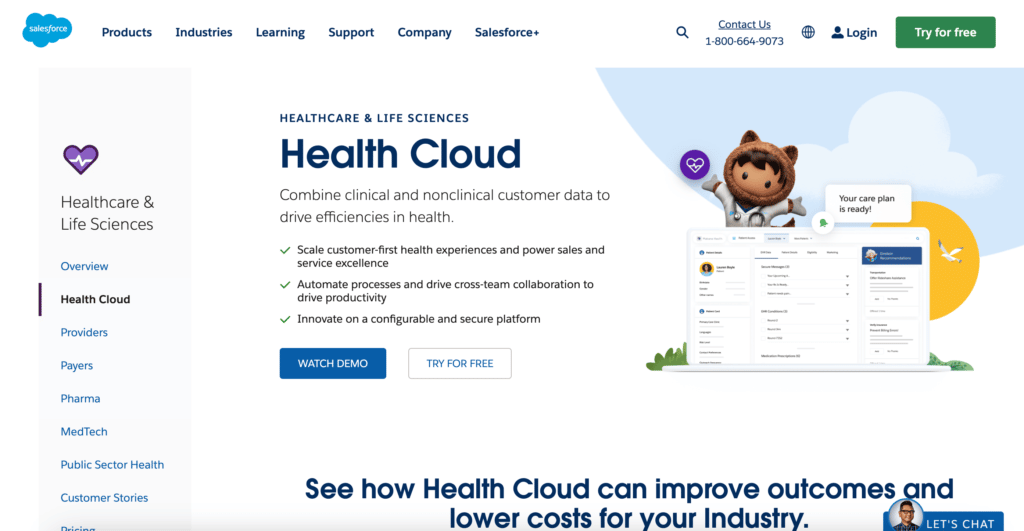
Why We Picked It
Salesforce Health Cloud is one of the best healthcare CRM options because the software provides industry-specific tools that help healthcare organizations stay organized and secure data.
Salesforce Health Cloud improves co-worker and customer relationships through faster communication and seamless data-sharing tools.
Further, pharmaceutical sales operations prefer Salesforce Health Cloud because it is an easier way to manage pipelines, client engagement, and communication tools.
Some of the key features that come with this CRM solution include the following:
- Training modules
- Medical record and patient management software
- AI-powered engagement tools (appointment reminders, automated contact center, etc.)
Lastly, Salesforce Health Cloud is HIPAA compliant, something medical professionals everywhere can appreciate.
Pricing
Pros
- Customizable set of clinical and insurance data modeling tools
- Integrations with other software solutions and electronic medical records (Zendesk, Freshdesk, and more)
- There is an iOS and Android mobile application
Cons
- It may be overwhelming for smaller healthcare providers
- It can be more expensive than other CRM tools
Netsuite
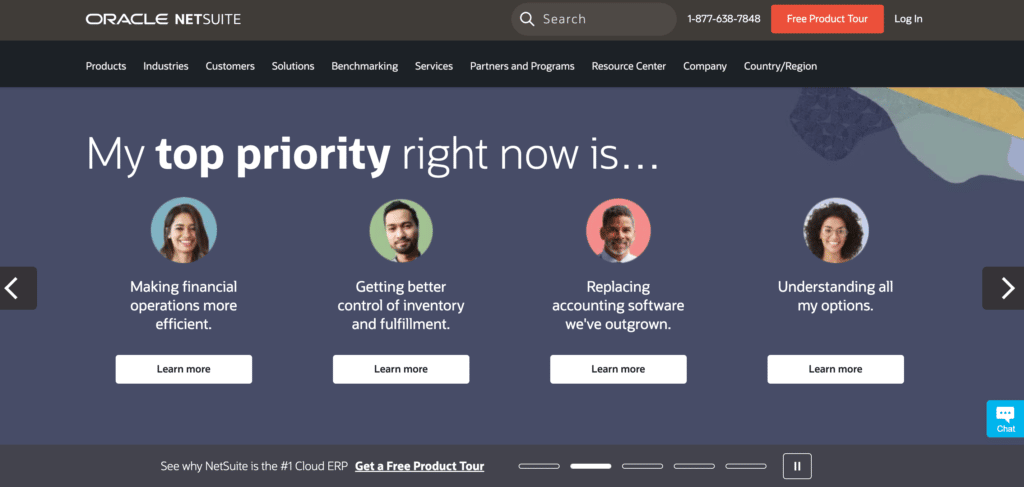
Why We Picked It
Netsuite is one of the most common healthcare CRMs because it puts all the needed information in one place.
For example, Netsuite incorporates a healthcare organization’s B2B and B2C interactions under one roof.
By doing this, businesses can provide improved and more accurate patient engagement strategies.
Also, Netsuite updates everything going on within a healthcare organization in real-time.
This HIPAA-compliant software streamlines the caregiving processes and accurately measures healthcare businesses.
Pricing
Netsuite’s plans vary in price depending on the client in question.
Therefore, users must contact Netsuite directly to get a person.
Pros
- Employee time tracking
- 24/7 real-time service (saves on administrative time and costs)
- Users can integrate Microsoft Outlook, MailChimp, Pardot, and more
Cons
- Plan pricing can change over time
- Additional customer support costs extra
- Customizing reports can be challenging
Monday.com
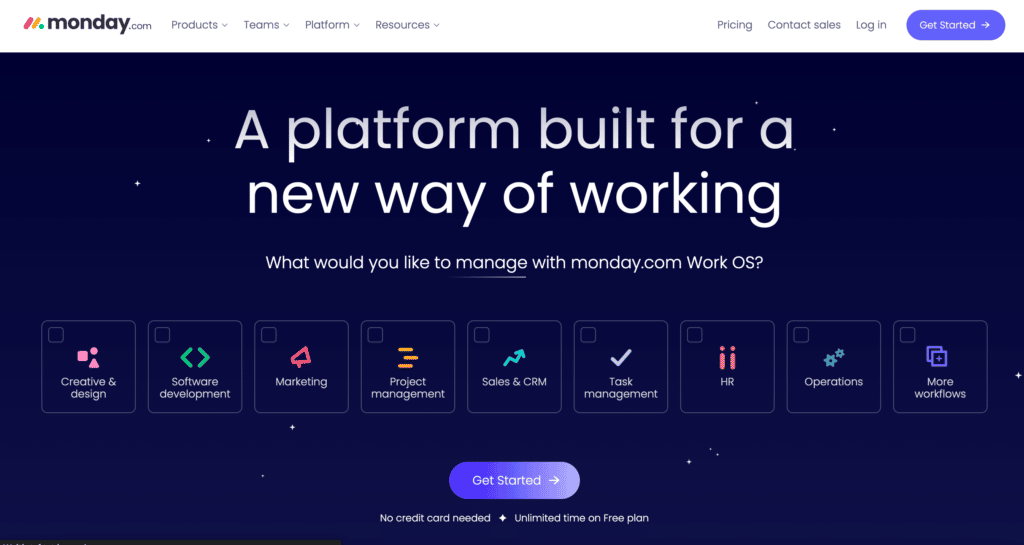
Why We Picked It
Although Monday.com wasn’t specifically built for the healthcare industry, it is still an excellent medical CRM tool.
That said, Monday.com allows businesses to create work management tools and applications.
Some fields Monday.com can help with include customer relationship management, project management, marketing campaigns, software solutions, and more.
Monday.com is best suited for a small to a mid-level health system that needs easy-to-use CRM solutions.
Pricing
- Individual: $0 forever
- Basic: $8 per user per month
- Standard: $10 per user per month
- Pro: $16 per user per month
- Enterprise: Customizable pricing
Pros
- There is a Free Forever plan.
- The dashboard is visually appealing and easy to understand
- There are over 200 customizable templates and automations
Cons
- Only the Enterprise plan is HIPAA compliant.
- Software is not ideal for large-scale companies.
Zoho
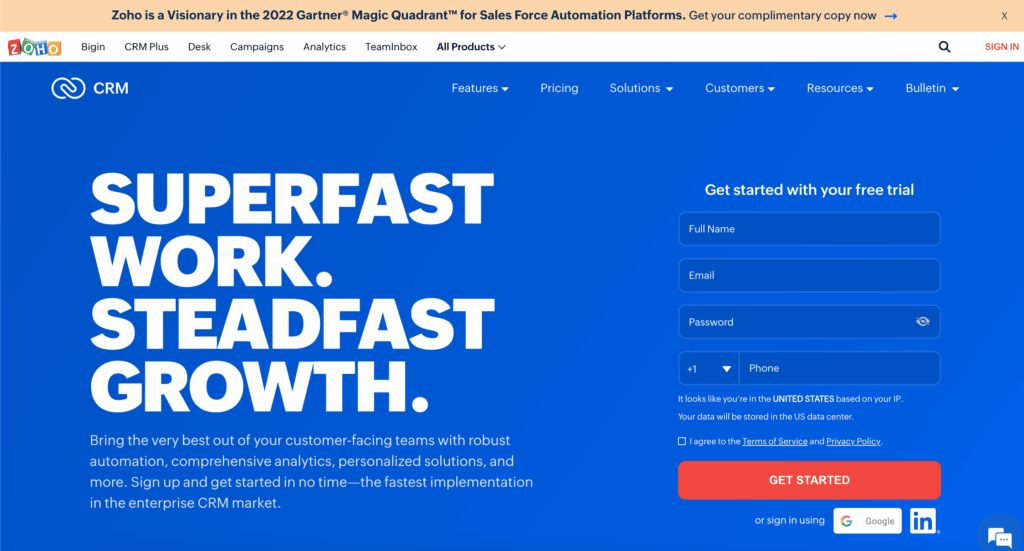
Why We Picked It
Zoho CRM is becoming more popular among medical practices.
The CRM platform is HIPAA-compliant, highly customizable, and easy to use.
With that, Zoho CRM allows health systems to track patient behavior and utilize this data to offer better patient care.
A few key features customers love about Zoho include workflow automation, lead management, and accurate analytics.
Pricing
Zoho offers four plans with inclusive CRM tools; these include:
- Free: $0
- Basic: $59 per organization monthly
- Standard: $119 per organization monthly
- Professional: $299 per organization monthly
- Enterprise: Customizable pricing for large organizations
Pros
- Includes social media CRM for healthcare providers
- Integrates seamlessly with other software
- There is a free medical CRM software edition available.
Cons
- The AI assistant could improve
- Some customers find tutorials hard to understand
Zendesk
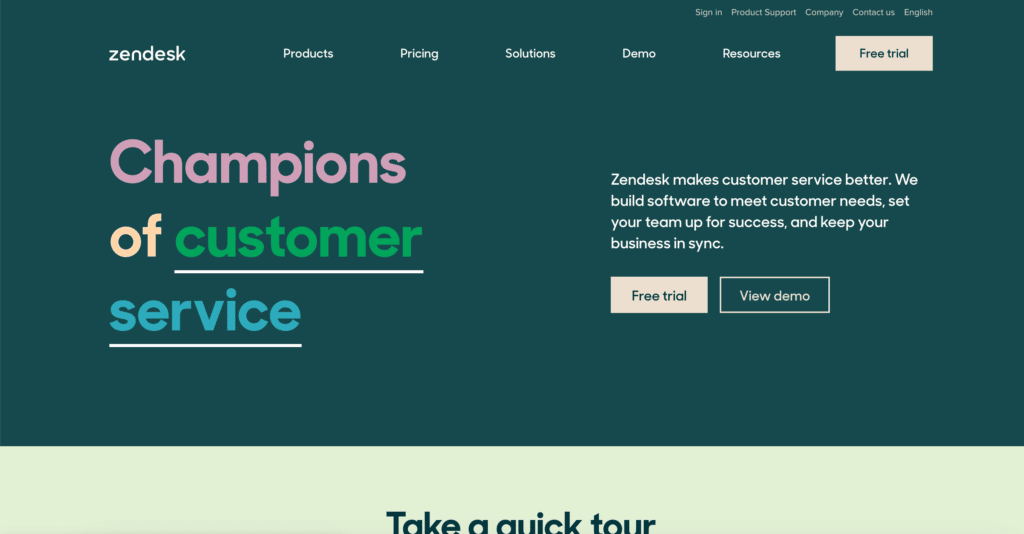
Why We Picked It
Zendesk is a HIPAA CRM solution that is becoming increasingly popular among pharmaceutical and medical devices companies.
With Zendesk, users can enjoy efficient communication tracking and pipeline visibility features.
For instance, this medical CRM tool automatically tracks and stores all emails and calls within a health system.
Therefore, the patient acquisition is more manageable as well as patient outreach.
Pricing
- Suite Team: $49 per user per month
- Suite Growth: $79 per user per month
- Suite Professional: $99 per user per month
Zendesk also offers a free trial, allowing users to discover whether or not the CRM solution will help improve patient engagement.
Pros
- Email template customization
- Easy for sales teams to crack useful data
- Patient outreach and communication tools
Cons
- Dashboards could provide better data
- Challenges uploading data
- It can be pricey for small to mid-sized businesses.
PatientPop
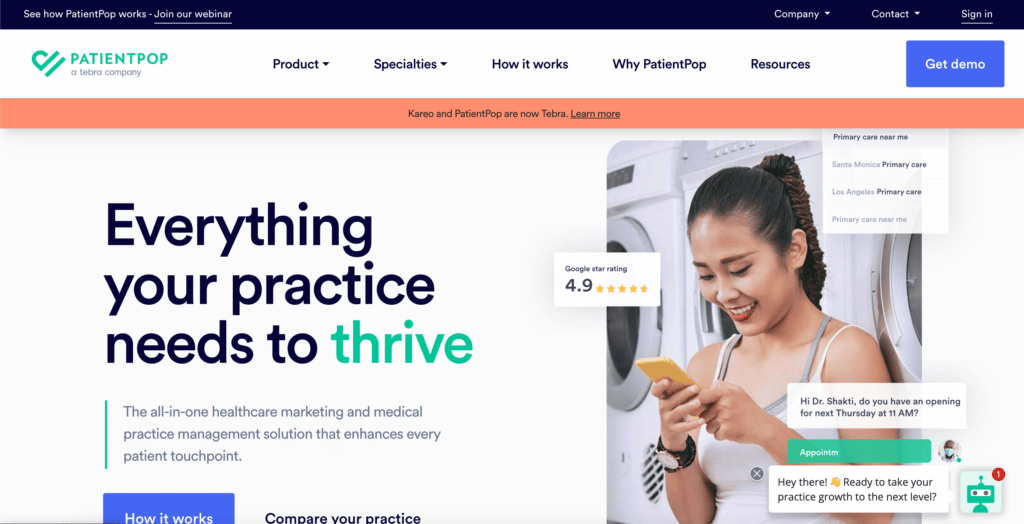
Why We Picked It
PatientPop is an excellent CRM solution for medical practices needing to improve business intelligence, organize lead management, and streamline patient communication.
With PatientPop, users can file electronic health records and look up physicians and patients within their system.
Also, PatientPop has important business functionalities, such as SEO tools and website management software.
Lastly, PatientPop is a HIPAA CRM, so users can ensure patient safety is one of their top priorities.
Pricing
PatientPop is a HIPAA-compliant solution that builds solutions around your business’s needs.
Therefore, plans are quote-based, and you must contact the sales team to receive a monthly price.
Pros
- Integrates with 60 electronic medical records software solutions
- Easier for teams to match the healthcare demands of patients
- Paid advertising capabilities
Cons
- Customer service could improve.
- Some customers say it costs too much for the services provided
- Onboarding and implementation are difficult
Leadsquared
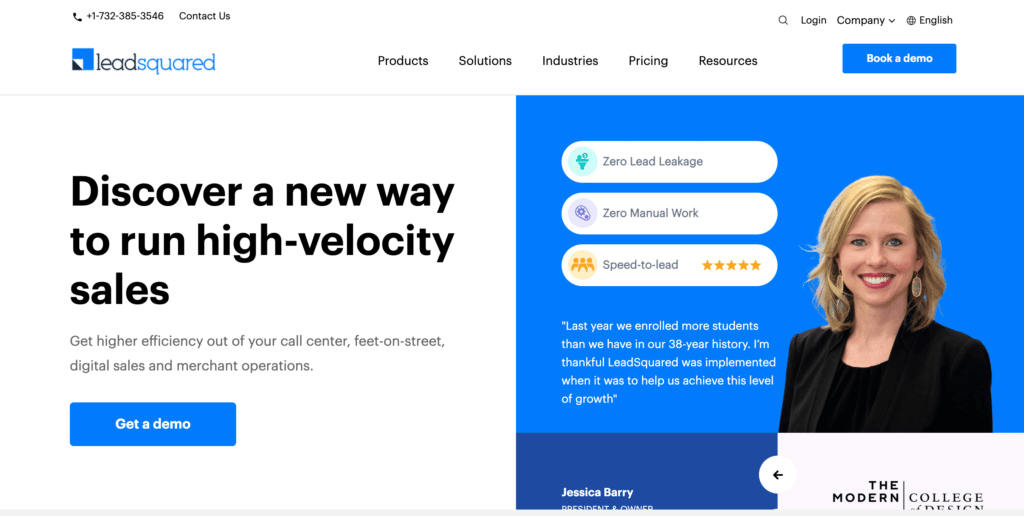
Why We Picked It
LeadSquare is one of the best healthcare CRM solutions for combining sales automation and mobile healthcare CRM.
For instance, LeadSquared helps users generate leads and send the information to the proper departments, making patient acquisition and communication more manageable.
Also, LeadSquared is HIPAA-compliant and has security features that keep patient health information private.
Further, this medical CRM software automates tasks, such as patient intake forms, appointment reminders, and more.
Users find LeadSquared easy to integrate into their business and appreciate the regulatory compliance procedures and customer management tools.
Pricing
Leadsquared offers three unique tools: sales execution CRM, field force automation, and marketing automation.
The pricing plans for the sales execution healthcare CRM tools are as follows:
- Lite: $25 per user per month
- Pro: $50 per user per month
- Super: $100 per user per month
- Ultimate: Customized pricing
The field force automation tool’s pricing is customized based on your business’s needs.
Lastly, the pricing plans for the marketing campaigns Leadsquared offers are:
- Basic: $400 per month
- Standard: $1,200 per month
- Enterprise: $2,500 per month
Pros
- LeadSquared healthcare CRM simplifies medical record collection
- Electronically verifies insurance
- The mobile app allows healthcare organizations to monitor their staff.
Cons
- Customer service responses are slow.
- Integration with other popular tools in the healthcare industry can be challenging.
- The telephone conversation recording feature doesn't always work as it's designed.
ClickUp
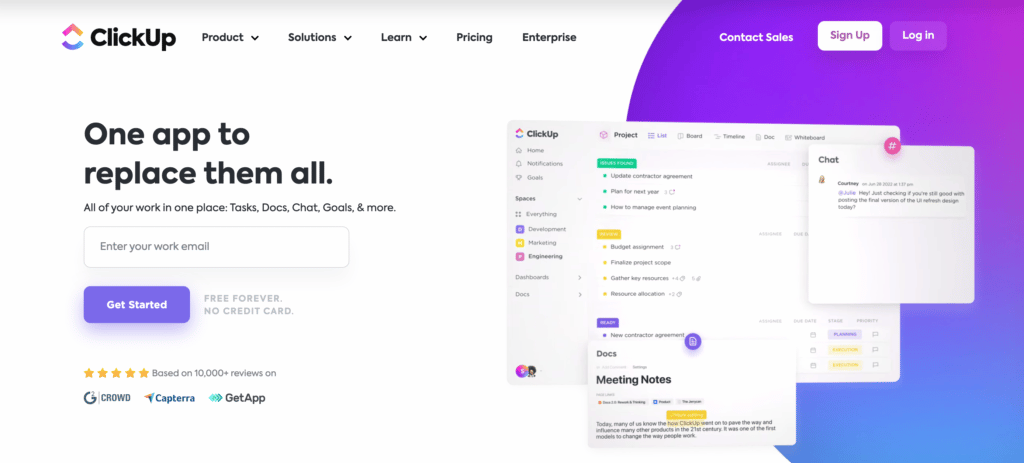
Why We Picked It
ClickUp is a healthcare CRM option that serves as an all-in-one tool, allowing health systems to design workflows that match their unique needs.
With ClickUp’s clean, intuitive dashboard, users can see everything they need in one place, including ongoing tasks, marketing automation tools, unread notifications, and more.
Further, ClickUp can help organize and manage electronic health records and ensure each user has access to the files they need.
Lastly, ClickUp offers many customization options and business process management features that help streamline day-to-day tasks.
Pricing
ClickUp is one of the few healthcare CRM options offering free tools with the Free Forever plan.
However, for companies that demand more business process management tools, ClickUp offers the following plans:
- Free: $0
- Unlimited: $5 per member per month
- Business: $12 per member per month
- Business Plus: $19 per member per month
- Enterprise: Customized pricing
Pros
- Easy to use
- Tracks task time and provide status updates
- Helpful automation features
Cons
- Requires some planning before implementing
- More expensive than other healthcare CRM options
- Some features are glitchy
Wrap Up
Choosing the right healthcare CRM software for your organization can be a tricky process, but it’s also a necessary one.
By taking the time to understand their needs, consider current issues in their organization, and test out different features and systems, organizations can find the perfect CRM software to meet their needs.
With this guide as a reference, organizations can decide which CRM software is right for them.
So go ahead, take the plunge, and select the best healthcare CRM software for your organization today!
Frequently Asked Questions
A CRM system in healthcare is a HIPAA-compliant software that helps organizations track and manage patient information, streamline operations, and improve patient satisfaction.
CRM stands for Customer Relationship Management. It is software that helps organizations manage customer relationships by streamlining operations, tracking patient information, and more.
CRM stands for Customer Relationship Management, and CMS stands for Content Management System. CRM software manages customer relationships, while CMS software creates, organizes, and manages website content. They both serve different purposes and should be chosen based on your organization’s needs.
The three main types of CRM are operational, analytical, and collaborative. Operational CRM helps organizations track patient data and streamline operations, analytical CRM provides insights into customer behavior and trends, and collaborative CRM focuses on communication between the organization and its customers.
The most commonly used CRM is Salesforce Health Cloud, which big organizations like Mercury Healthcare use. It provides organizations with tools to help them manage patient data, streamline operations, and improve patient satisfaction. It also follows HIPAA compliance standards, making it suitable for use in healthcare settings. Other popular choices include Enquire CRM and ClickUp.
Newsletter Signup
Join The Leads Field Guide Newsletter for tips, strategies and (free) resources for growing your leads, and closing more deals.

